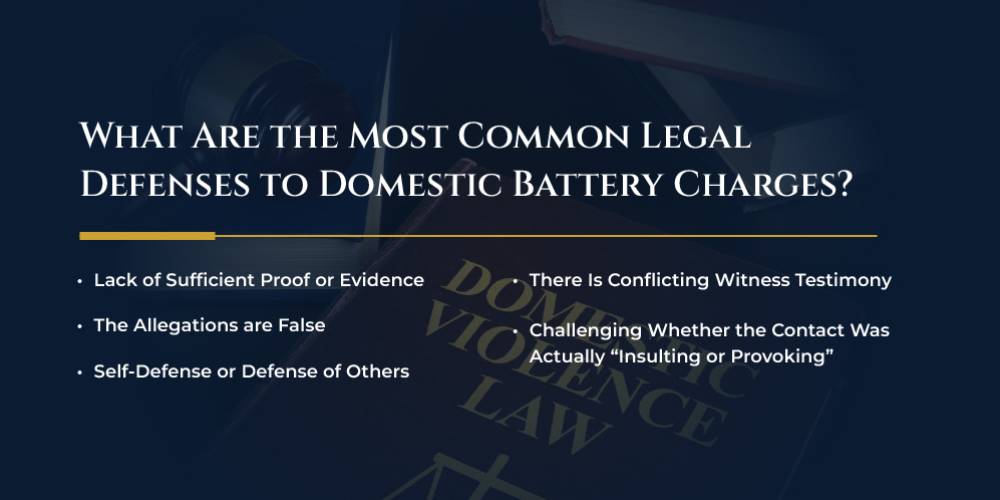What Are the Penalties for an Illinois Domestic Violence Charge?
 Allegations of domestic abuse in Illinois are among the most serious charges you can face. Even a first-time arrest can carry harsh penalties, and a conviction can have consequences that go far beyond fines and jail time. These consequences can include firearm restrictions, difficulties obtaining employment, and even challenges in renting a home.
Allegations of domestic abuse in Illinois are among the most serious charges you can face. Even a first-time arrest can carry harsh penalties, and a conviction can have consequences that go far beyond fines and jail time. These consequences can include firearm restrictions, difficulties obtaining employment, and even challenges in renting a home.
Domestic violence, commonly referred to as domestic battery in Illinois, is a serious issue among couples and families. If you have been charged with domestic battery or a related domestic violence charge, it is important to understand your rights and the charges against you. A skilled Will County, Illinois defense attorney can help you navigate your legal options and advocate for your rights in court.
Illinois Domestic Battery Laws
Illinois domestic battery (720 ILCS 5/12-3.2) occurs when a person causes harm to another person’s body, makes physical contact, or acts insultingly or confrontationally to a family or household member. It is important to note that a home or family member includes many people, including spouses and former spouses, stepchildren, children, parents, those related by blood, those living in the same home, or people who are engaged or dating.
Acts that may qualify as domestic battery in Illinois include physical abuse such as hitting, slapping, kicking, intimidation, harassment, forcing someone to do something against their will, or otherwise causing injuries or interfering with someone’s personal liberty.
What Are the Different Types of Domestic Battery Charges in Illinois?
An individual may be charged with domestic battery, which has a variety of penalties, depending on the harm to the victim and whether this is a first-time offense or a subsequent offense. Aggravated domestic battery is charged when great bodily harm occurs, a deadly weapon is used, or the victim is strangulated. Violation of an Order of Protection is a separate charge that brings its own set of penalties.
Illinois Domestic Battery Penalties
Domestic battery charges vary in their penalties, and convictions often result in jail time, serious fines, and protection orders, depending on the situation surrounding the charges.
Domestic battery penalties in Illinois include the following:
- A Class A misdemeanor when an individual is charged with causing bodily harm or provoking or insulting physical contact. This charge carries a potential penalty of up to one year in jail and a fine of up to $2,500.
- A Class 4 felony when domestic battery occurs and the alleged offender has a previous conviction for a domestic violence-related offense, such as violating an Illinois Order of Protection, aggravated battery, or stalking. This carries a penalty of up to three years in prison and a fine of up to $25,000.
- A Class 3 felony when three domestic battery convictions are already on the offender's record. A conviction carries up to five years in prison and a fine of up to $25,000.
- A Class 2 felony when the alleged offender already has four or more prior domestic battery or domestic violence-related charges. This is punishable by up to seven years in jail and a fine of up to $25,000.
It is important to note that aggravated domestic battery can occur when the injuries to the victim result in permanent disability or disfigurement. This is also a Class 2 felony in the state of Illinois.
What Are the Most Common Legal Defenses to Domestic Battery Charges?
While the exact defense will depend on the specific charges and evidence, some of the more common legal defenses to domestic battery charges include:
Lack of Sufficient Proof or Evidence
Since many domestic violence and domestic battery cases come down to "he said/she said," there may be insufficient evidence that the person charged was actually the aggressor. A fight may have occurred, but both parties could be equally at fault. The prosecution must prove all elements of the crime beyond a reasonable doubt. An experienced defense lawyer can show the judge and jury that the prosecutor has not met his or her burden of proof.
The Allegations are False
During a contentious divorce or child custody dispute, a spouse or partner may falsely accuse an individual of domestic violence as a means of gaining an advantage in court. For example, a mother seeking sole custody may make a false domestic violence claim to keep the other parent from getting custody or visitation rights. During a divorce, one spouse may claim domestic abuse as a means of getting a better marital settlement award. A skilled defense attorney will show that the claims of domestic violence are nothing more than revenge or to gain an advantage.
Self-Defense or Defense of Others
Suppose it can be shown that the person charged with domestic violence was only defending himself or herself or was defending another person. In that case, the charges may be dismissed, or a not guilty verdict may be rendered. Self-defense is a valid defense against domestic violence so long as it can be proven beyond a reasonable doubt.

There Is Conflicting Witness Testimony
Domestic violence cases are notoriously messy. There may be witnesses on both sides telling conflicting versions of the events. When law enforcement arrives at the scene of a domestic violence call, they may have difficulty determining which party is at fault, especially when witnesses tell conflicting stories. A skilled criminal defense lawyer knows how to get to the truth to determine who was at fault and who actually committed a crime.
Challenging Whether the Contact Was Actually "Insulting or Provoking"
A criminal defense attorney will question whether the actions of the defendant actually rose to the level of "insulting" or "provoking." Particularly in cases where both parties were involved in the argument or physical altercation, the person being charged with the crime of domestic violence must have actually had contact with the victim that rises to the level of insulting or provoking.
Contact a Joliet, IL Domestic Battery Defense Lawyer
Domestic battery and related domestic violence offenses carry severe consequences in Illinois. The first thing you should do after receiving any domestic battery charge is contact an experienced Will County, IL domestic battery defense attorney at McNamara Phelan McSteen, LLC. Attorney Polito has extensive experience in criminal defense and the family law situations that may surround domestic battery charges.
This affords him the knowledge and negotiation skills to work for the most favorable outcome in your case. Early intervention can reduce charges and help prevent long-term consequences. Call 815-727-0100 to schedule your free consultation.
 815-727-0100
815-727-0100













